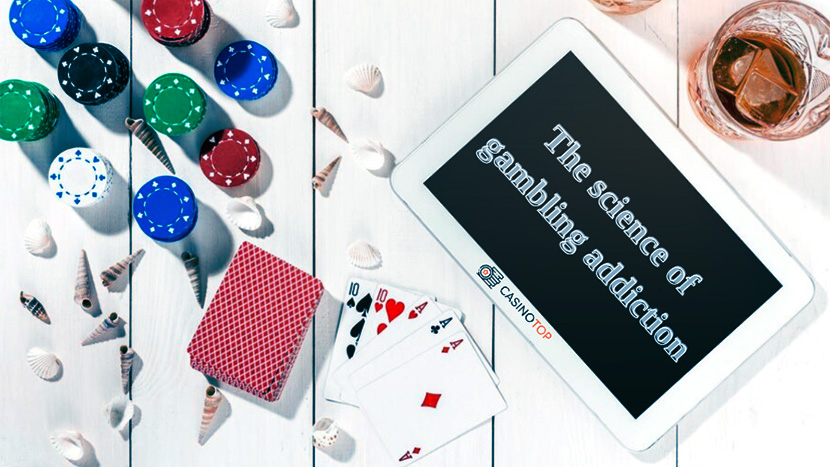The Science of Gambling Addiction
A typical human brain releases dopamine while gambling. The hormone is responsible for the excitement you feel during the gambling process. It’s not only released when you win but also equally upon losing.
This usually causes issues for some people, as whenever the excitement runs its course, it’s always somewhat difficult for such folks to leave the games.

How Does Gambling Affect the Brain?
In addition to the dopamine being released, successful gambling rounds are accompanied by pleasure and motivation for most people. More cash rewards and overall enjoyment usually accompany those. Though some folks call it quits and leave when they’ve had enough, not everyone often feels this way. After losing money, such players usually remain adamant and try betting to regain all they’ve lost. Such people frequently tend to have addiction issues with the wagering industry.
How to prevent yourself from gambling addiction and play safe?
Casinos ought to take an active role in preventing excessive betting by addicts. As it is, only a few do. So, how do you determine which casino does? Easy, check out what players say about them on the web. You’d also want to visit the terms and conditions section of the casino to know more about the add-ons they offer.
For some pathological gamblers, a psychiatric evaluation may be needed to decide whether or not any underlying health issues cause gambling obsessions. Even at that, the safest online casinos often have measures to ensure you don’t have to gamble more than you can afford impulsively. Such constantly include a series of set stops features that restrict you from betting more than you can reasonably put up for a given period. We heartily recommend taking advantage of such.
Studies conducted by a public health agency showed that betting is pretty easy to sprawl up from enjoyment into an addiction. Habits that are difficult to break out from may constantly lead to out-of-control actions for some people.
What Exactly Makes Gambling Addictive?
Several elements may cause a person to turn into a pathological gambler. Studies indicate that factors such as mood disorders, environmental influences, financial status, age, and background are the most influential in making people addicted to problematic wagering.
A diagnostic and statistical manual published in 2013 by leading psychiatric association experts – Conceptual Framework of Harmful Gambling – shows that eight major elements lead to a betting disorder. Researchers ultimately realized that these elements can be broadly grouped into betting-influenced factors and some general characteristics.
These elements are broken down into betting-specific factors (such as betting environment, betting exposure, betting types, and betting resources) and general components (such as cultural, social, psychological, and genetic dispositions).

What Factors Might Provoke Problem Gambling?
Here are the elements that might provoke a betting disorder issue.
Gambling environment and resources
- Environmental pressures and influences can directly impact how frequently a person gambles.
- Many casinos close to an individual’s location would also affect the person’s pathological wagering behavior.
- Gambling faces regulations from the government via licensing bodies. Its popularity among people is caused by its demand.
- Ultimately, where you live and the overall outlook toward gambling activity in your neighborhood would directly impact just how likely an individual is to develop gambling issues.
Biological factors
- Studies indicate that certain individuals who suffer from inactive brain reward processes may naturally seek and get addicted to thrill-laden activities.
- Analysis has shown distinctions in brain sectors involved in making decisions of normal humans and such people.
- Usually, these factors may negatively impact a person’s reward system and drastically affect how they view risks.
Cultural factors
- Some communal systems often see gambling as a thrilling activity. Such outlooks usually make it difficult to identify and address betting problems.
- As an individual’s cultural background mostly has a solid impact on their approach to life, this may make it difficult for them to regard gambling as an issue.
- Such would also psychologically hinder the individual from seeking out help.
Psychological factors,
- Psychological disorders and conditions and coping styles, social learning, and beliefs could make someone more susceptible to harmful betting.
- Individuals with gambling difficulties may also suffer from substance abuse and mood disorders like depression and anxiety.
The Diagnosis of Gambling
Individuals’ mental-health status reports, medical history, and how frequently they bet help decide whether they have betting behaviour problems. Such info helps researchers better understand and resolve addiction troubles. At times, a person’s medical background may reveal the presence of medications or underlying psychological issues that contribute to addiction problems.

Treatment for Gambling Addiction
Similar to most addiction problems – even drug addiction, making admissions that you’re addicted to gambling is the initial step to take in treating the problem.
Compulsive gamblers hardly ever do realize they’re addicted, making treatment very troubling to deliver. Doctors usually prescribe mood stabilizers and antidepressants to treat their addiction and relieve anxiety buildups. For more hardcore cases of compulsive gambling, mental disorder medications usually come in handy to treat the condition.
Behavioral changes and support are usually the focus of long-term treatments to overcome addiction to gambling. Psychotherapy, whether behavioral or cognitive, is often beneficial. Despite treatments, it’s important to realize that relapse is still possible, especially if subject to gambling environments or other gamblers. You may want to read more about the best casinos traits and characteristics for more useful tips. Those undoubtedly would come in handy in your research.
The consequences of addiction
Some socioeconomic consequences, like poverty and even financial bankruptcy, are obvious negative consequences of gambling. Other indirect effects include breakdown in relationships and an undesirable breakdown in life patterns. Stress is yet another unpleasant consequence of a betting disorder. Usually, this builds up with time.

Conclusion: Addiction is the dark side of gambling
Gambling habit is an active and pressing societal issue that shouldn’t be treated lightly. As we’ve highlighted, an underactive brain reward system may leave undesirable behavior patterns on a person’s neural pathways and lead to a gambling disorder. Betting addiction is not limited to people who play in traditional casinos; it’s also a real issue for folks who partake in online gambling and the purchase of other gambling products often have to face.
To stop gambling disorders in players who risk betting excessively, then the brain regions responsible for the playing disorder usually have to be isolated and corrected. The inhibitable impulses and feelings of financial helplessness make some players experience in the face of losses also have to be addressed.
































































































